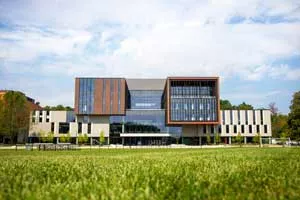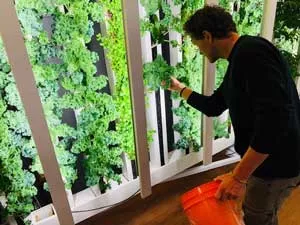
Sustainable UTM: Four departments making a difference
When it comes to combating climate change, every action—big or small—can make a difference. U of T has embarked upon an ambitious Low-Carbon Action Plan to cut greenhouse gas emissions and become a “net-zero” institution. Find out how four departments at U of T Mississauga are contributing to that goal:
SUSTAINABLE TRANSPORTATION

The campus offers programs like the Ecopark rebates for green vehicles, membership in Commute Ontario and designated parking spaces for carpool permits to encourage drivers to reduce their environmental impact. In 2019, UTM installed six new electric vehicle charging stations in the lower level of P8, across from the Recreation, Athletics & Wellness centre. “We knew there was interest—and an expectation—for UTM to take the lead,” Hoppie says. The spaces average 200 charges per month, the equivalent of a 4,451 kg reduction of greenhouse gas emissions avoided. “That’s like planting 114 trees and letting them grow for 10 years,” Hoppie says. “UTM is proud to support green initiatives like this.”
“The most sustainable way to get to campus is public transportation or cycling,” adds Chelsea Dalton, sustainability coordinator with UTM’s Sustainability Office. The UTM Shuttle bus transports 25,000 passengers a month between campuses. The U-Pass gives students unlimited fare-free rides on MiWay, and Brampton Transit runs an express route to campus from the Brampton Gateway Terminal. Those who like to travel by pedal power can rent one of 30 bicycles free of charge from UTM’s popular BikeShare program.
SUSTAINABLE BUILDING

Elsewhere on campus, retrofit projects are also helping to bump UTM’s sustainability achievements. Over the summer, forty-five solar thermal panels—known as evacuated tube collectors—were installed on the roof of the Recreational, Athletics & Wellness Centre. The panels harness the power of the sun to heat the building, as well as the pool and hot water systems, and help to reduce campus greenhouse gas emissions by 29 tonnes annually.
SUSTAINABLE DINING
Surveys regularly place sustainability high on the priority list for those dining on campus, and UTM’s Hospitality & Retail Services team is listening. “We are always looking for new initiatives and student suggestions to improve sustainable food service offerings,” says Vicky Jzeierski, director of hospitality and retail services. “We are committed to protecting the environment and finding new creative ways to grow.”
In recent years, the team has implemented several new programs with a focus on sustainable dining. In 2016, UTM was designated as a Fair Trade Campus, offering fair trade treats and hot beverages across the campus. Fair trade ingredients, like cinnamon and cocoa, have been incorporated into dishes prepared in the UTM kitchens, and the hospitality team holds community outreach events to help spread the word about the positive impact that fair trade farming has on the communities where the ingredients are produced.

In addition to greens, the UTM hospitality team also began producing its own honey in 2017. Beekeeper Don Forster harvests nearly 1,000 lbs of honey a year from the hives on top of the Instructional Centre. The honey is used in the UTM kitchens and sold through the hospitality and retail services department. “The program also helps to decrease waste as we are no longer purchasing pre-packaged honey,” says Jezierski. “UTM hospitality is dedicated to spreading the word about beekeeping and supporting pollinators,” adds retail services manager Suresh Krishnan. “We are a small campus but we can do so much to support sustainability initiatives.”
SUSTAINABLE COMMUNITY

Read more about U of T’s ambitious Low-Carbon Action Plan to cut greenhouse gas emissions and become a “net-zero” institution.
